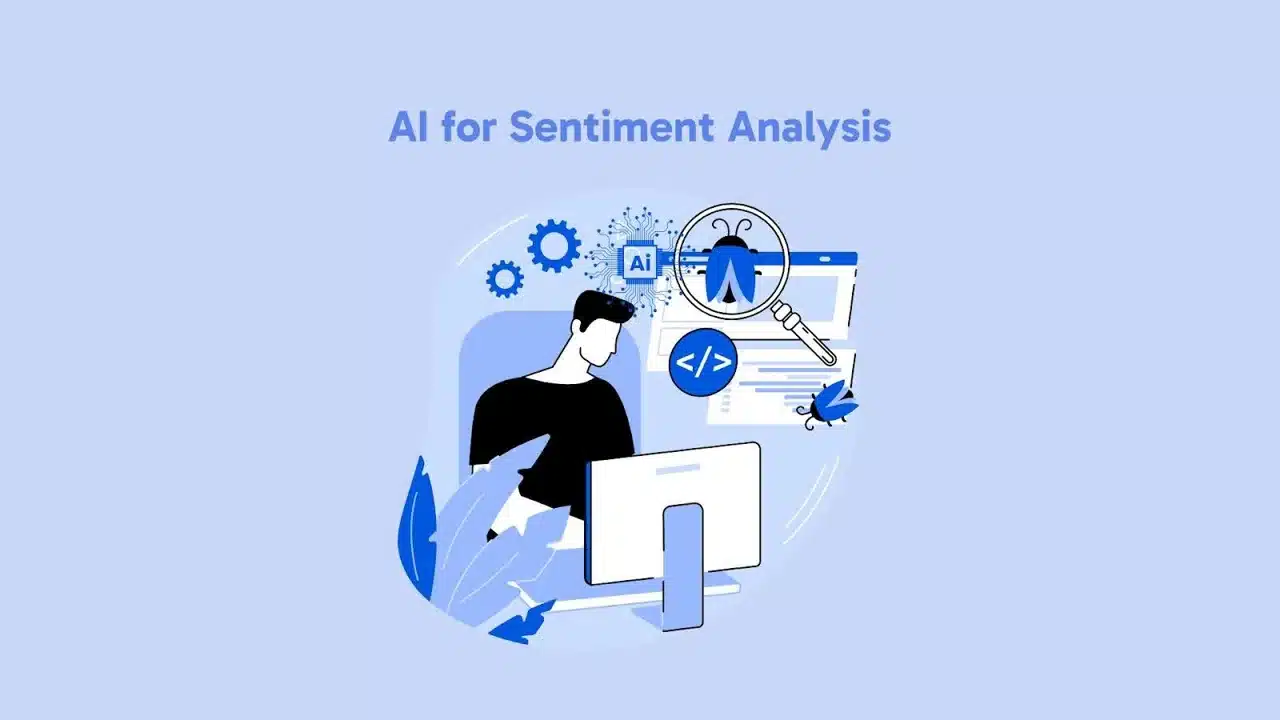In today’s data-driven marketing world, AI sentiment analysis in marketing is transforming how brands understand and engage with customer emotions at scale. By leveraging advanced natural language processing (NLP) and AI emotion detection, marketers can interpret feelings behind social media chatter, reviews, and direct feedback in real time. This enables brands to move beyond raw data, crafting empathetic and timely strategies that resonate deeply with customers. This article explores the evolution of AI sentiment analysis, the latest tools and features, advanced tactics for marketers, and real-world business impact. It also highlights how Amquest Education’s Digital Marketing and Artificial Intelligence course equips marketers with AI-powered learning, hands-on experience, and industry insights to master this transformative technology.
The Evolution of AI Sentiment Analysis in Marketing
Sentiment analysis, also called opinion mining or emotion AI, started as a manual or keyword-based method to classify feedback as positive, negative, or neutral. Early techniques often missed nuances like sarcasm or mixed emotions, limiting their effectiveness. The advent of natural language processing (NLP) and machine learning revolutionized sentiment analysis. Today, AI models interpret not only what customers say but how they say it—understanding context, tone, and subtle emotional cues in real time. This evolution has made AI sentiment analysis indispensable for customer emotion tracking and brand monitoring across vast data sources, from social media to call center transcripts.
Cutting-Edge Features and Tools in AI Sentiment Analysis
Modern AI sentiment analysis platforms offer a range of powerful capabilities:
Real-time Emotion Detection
Identifies emotions such as frustration, happiness, or confusion during customer interactions, enabling immediate response.
Contextual Understanding
Deciphers sarcasm, industry jargon, and complex expressions beyond simple keyword spotting.
Multi-channel Data Integration
Combines insights from social media analytics, surveys, reviews, and direct communications for a comprehensive view of brand sentiment.
Granular Emotion Scoring
Assigns sentiment values on a scale (e.g., 0 to 10), weighting different conversation parts to reflect true feelings, crucial for post-interaction analysis.
Dashboard Analytics and Alerts
Provides marketers and support teams with trend monitoring, early churn detection, and proactive intervention tools.
Leading tools also incorporate AI emotion detection to recognize a broad spectrum of feelings—anger, disappointment, admiration, gratitude—beyond traditional positive/negative/neutral categories. These advancements enable brands to engage customers with greater emotional intelligence.
Advanced Tactics to Maximize AI Sentiment Analysis Impact
To unlock the full potential of AI sentiment analysis in marketing, consider these proven strategies:
Integrate Sentiment Data with CRM and Marketing Automation
Use sentiment scores to trigger personalized campaigns and customer service workflows, boosting engagement and retention.
Leverage NLP Marketing Tools for Content Optimization
Analyze customer language trends to tailor messaging that emotionally resonates with target audiences.
Combine Sentiment Analysis with Social Media Analytics
Monitor brand mentions and sentiment shifts in real time to respond swiftly to crises or capitalize on positive buzz.
Use Emotional AI Tools for Audience Segmentation
Develop customer personas based on emotional profiles to target messaging more precisely.
Continuously Train AI Models with Industry-Specific Data
Enhance accuracy by incorporating language and sentiment nuances specific to your market.
These tactics help marketers move from data collection to actionable, personalized engagement that drives measurable results.
The Power of Storytelling and Community Engagement
AI sentiment analysis reveals not only what customers feel but why they feel it. Marketers can harness these insights to craft authentic stories that build emotional connections and foster community. By identifying key emotional drivers, brands can:
Develop Content That Speaks Directly to Customer Values
Create messaging that addresses customer pain points and aspirations.
Encourage User-Generated Content
Reflect genuine experiences through authentic customer voices.
Create Influencer Partnerships
Align collaborations with audience sentiment and trust.
For example, brands that align messaging with customer emotions see higher loyalty and advocacy, turning data-driven engagement into compelling narratives.
Measuring Success: Analytics and Insights
Effectively using AI sentiment analysis requires a robust framework to track key performance indicators (KPIs):
| KPI | Description | Use Case |
|---|---|---|
| Sentiment Score | Quantitative measure of overall customer emotion (0-10 scale) | Track satisfaction trends over time |
| Social Media Sentiment Ratio | Positive vs. negative mentions across platforms | Monitor brand reputation and campaign impact |
| Customer Churn Prediction | Early warning from negative sentiment spikes | Enable proactive retention and targeted interventions |
| Engagement Rate | Correlation of sentiment with content interactions | Optimize storytelling and influencer collaborations |
AI-powered dashboards enable marketers to detect sentiment shifts instantly, facilitating agile decision-making and more empathetic customer interactions.
Business Case Study: Starbucks’ Success with AI Sentiment Analysis
Starbucks has long prioritized customer experience and loyalty. To deepen its understanding of consumer emotions, the brand integrated AI sentiment analysis into marketing and customer service.
Challenges
Detecting subtle shifts in sentiment across thousands of daily social media mentions and feedback channels was difficult. Traditional surveys lagged behind real-time sentiment changes.
Tactics
Continuous monitoring of social media and customer reviews with AI sentiment tools
Integrating sentiment insights with CRM to personalize offers and loyalty rewards
Real-time emotion detection during customer service calls to improve agent responses and reduce churn risk
Results
Positive social media sentiment increased by 15% within six months
Customer churn reduced by 10% through proactive outreach triggered by sentiment alerts
Customer satisfaction scores rose 12%, reflecting more empathetic service delivery
Starbucks’ example illustrates how AI sentiment analysis enhances brand monitoring and drives measurable business outcomes through data-driven engagement.
Why Choose Amquest Education to Master AI Sentiment Analysis?
Amquest Education in Mumbai offers a cutting-edge Digital Marketing and Artificial Intelligence course designed for marketers eager to harness AI sentiment analysis in marketing. Key strengths include:
AI-led Modules and Practical Training
Hands-on experience with NLP marketing tools, AI emotion detection, and real-time analytics using industry-standard software.
Internships and Placement
Partnerships with leading digital marketing firms and AI startups provide valuable industry exposure and job opportunities.
Experienced Faculty
Learn from seasoned professionals and AI experts who integrate real-world case studies and best practices.
Flexible National Online Access
Students across India can benefit from Amquest’s expertise without relocating.
Up-to-Date Curriculum
Regularly refreshed to include the latest AI sentiment analysis tools and marketing automation techniques.
This blend of theory and applied skills ensures graduates are job-ready and confident in driving AI-powered marketing strategies.
Actionable Tips for Implementing AI Sentiment Analysis
Define Clear Objectives
Know which customer emotions or behaviors to track and why.
Choose the Right Tools
Select AI and NLP marketing platforms that integrate well with your systems and support multi-channel data.
Train AI Models with Domain Data
Improve sentiment accuracy and contextual understanding.
Monitor Sentiment Continuously
Use real-time dashboards and alerts to act promptly.
Combine Sentiment Data with Qualitative Research
Validate AI findings through surveys and interviews.
Align Marketing Content with Emotional Insights
Develop messaging that resonates with detected emotions.
Leverage Social Media Analytics
Track brand mentions and sentiment trends to manage reputation proactively.
Measure Impact
Use KPIs like sentiment scores, churn rates, and engagement metrics to evaluate effectiveness.
FAQs
Q1: How does AI sentiment analysis in marketing improve customer emotion tracking?
AI sentiment analysis leverages NLP and machine learning to interpret emotional tones behind customer communications, enabling real-time tracking of feelings such as satisfaction, frustration, or excitement.
Q2: What are popular NLP marketing tools for sentiment analysis?
Tools like Balto, Revenue.io, and Level AI offer advanced NLP capabilities for live emotion detection, sentiment scoring, and dashboard analytics to enhance customer engagement strategies.
Q3: How can social media analytics complement AI sentiment analysis?
Social media analytics provide real-time sentiment data from platforms like Twitter and Instagram, helping brands monitor public opinion, detect crises early, and identify influencer opportunities.
Q4: What is AI emotion detection and why is it important?
AI emotion detection goes beyond positive/negative sentiment by recognizing complex emotions such as anger, disappointment, or gratitude, giving brands a richer understanding of customer feelings.
Q5: How does brand monitoring benefit from sentiment analysis?
Brand monitoring with AI sentiment analysis helps companies track reputation, identify emerging issues, and tailor messaging to maintain a positive brand image across channels.
Q6: Why choose Amquest’s Digital Marketing and Artificial Intelligence course?
Amquest offers expert-led training, hands-on AI modules, real internships, and flexible learning options—ideal for marketers aiming to master AI sentiment analysis and leverage it for business growth.
Conclusion
Harness the power of AI sentiment analysis in marketing to transform customer emotion data into business success. Whether in Mumbai or online, Amquest Education’s comprehensive course prepares you to lead in this dynamic field. Explore the course and begin your AI-powered marketing journey today.






